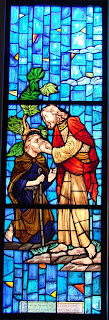How then were your eyes opened?
This past Sunday, the Gospel lectionary text was the story of a man who was born blind and his interaction with Jesus. It is a confusingly beautiful story of pain, sorrow and restoration, life.
Take a moment to read it...
John 9:1-12
1 As he went along, he saw a man blind from birth. 2 His disciples asked him, "Rabbi, who sinned, this man or his parents, that he was born blind?" 3 "Neither this man nor his parents sinned," said Jesus, "but this happened so that the work of God might be displayed in his life. 4 As long as it is day, we must do the work of him who sent me. Night is coming, when no one can work. 5 While I am in the world, I am the light of the world." 6 Having said this, he spit on the ground, made some mud with the saliva, and put it on the man's eyes. 7 "Go," he told him, "wash in the Pool of Siloam" (this word means Sent). So the man went and washed, and came home seeing. 8 His neighbors and those who had formerly seen him begging asked, "Isn't this the same man who used to sit and beg?" 9 Some claimed that he was. Others said, "No, he only looks like him." But he himself insisted, "I am the man." 10 "How then were your eyes opened?" they demanded. 11 He replied, "The man they call Jesus made some mud and put it on my eyes. He told me to go to Siloam and wash. So I went and washed, and then I could see." 12 "Where is this man?" they asked him. "I don't know," he said.
Throughout the season of Lent, I have been reading a daily devotion on Journey to the Cross, a wonderful online Lenten Devotional written by Andy Watts and Amy Dodson-Watts. On Wednesday, their devotional centered on the above passage from John about the blind beggar. About this passage, they wrote the following,
Could this story be about visibility more than sight? People in Jesus’ day believed blindness was caused by sin. The blind lived tough and lonely lives. They were invisible and out of sight to the world. Chances are, this man never had a real conversation with anyone but his parents or another beggar. He couldn’t see others. They couldn’t see him. And he couldn’t see himself as fully human.
But with Jesus, all that changed. The man began, in Thomas Merton’s words, to 'shine like the sun.' He became visible to others, and they to him. No longer invisible, he was God’s beloved. The muddy gift restored his personhood and his community.
What part of you needs the healing mud of Jesus? What do you need to more fully love God, your neighbor, and yourself? If people were to say of you, 'Is this not the person who used to ________ and _______?' how would you fill in the blanks?
 |
| Pool of Siloam, Jerusalem |
Jesus came to restore sight. Jesus came to restore personhood. Jesus came to restore community.
Go, wash and be restored!


Comments
Post a Comment